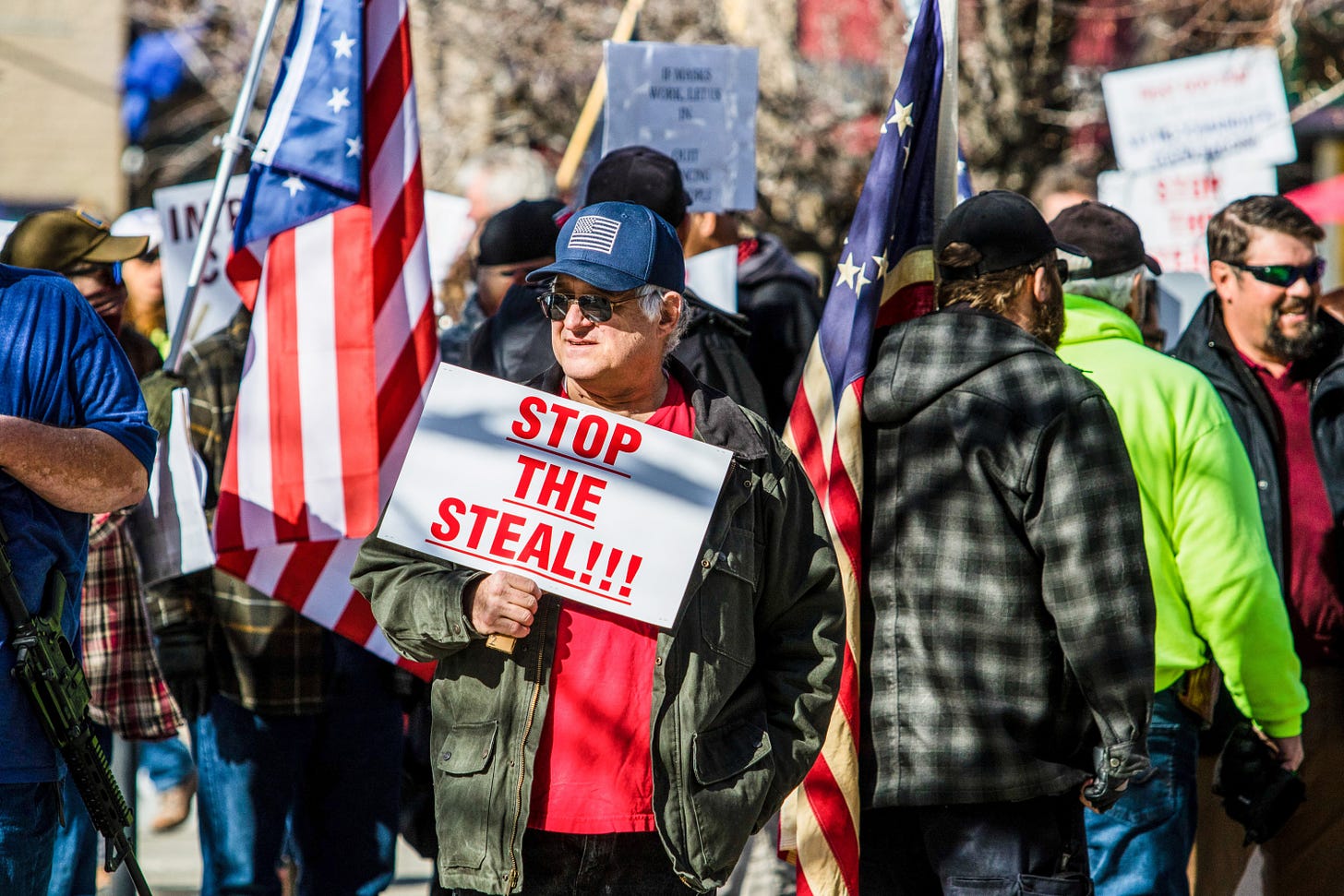
The Pattern of GOP Voter Fraud
In case after case from 2020, it turns out that Republicans were the ones misbehaving at the ballot box.

On Tuesday, Donald Kirk Hartle, the CFO of a Nevada company that hosted a September 2020 rally for Donald Trump, pleaded guilty to voting twice in last November’s election, including once in his dead wife’s name. Hartle is just the latest in a string of apparent Trump supporters who committed voter fraud in the 2020 presidential election. This pattern is a warning of the lawlessness among Trump’s followers that could engulf us all.
Hartle’s case is particularly stomach-turning. Last November, before it was discovered that he was the culprit, he feigned “disbelief” that someone would steal and submit his dead wife’s ballot. “That is pretty sickening to me, to be honest with you,” he said—adding, with a provocateur’s flair, that “it makes you wonder how pervasive this is.”
We know from Trump Attorney General William Barr and Acting AG Jeffrey Rosen that ballot fraud was not widespread and had no effect on Trump’s defeat. That fact did not stop Trump and his enablers from banging the “Stop the Steal” drum incessantly.
Those enablers were happy to exploit Hartle’s cover story before his confession. Republicans hyped Hartle’s phony claim of an unknown ballot thief as Exhibit A in their case that the election was stolen. American Conservative Union chair Matt Schlapp joined in. On Fox News, Tucker Carlson used the case to amplify Trump’s Big Lie about the election.
Hartle’s faux sanctimony playing on his wife’s death may have set a new low for hypocrisy, but there’s more than a single case at play here.
The Heritage Foundation, the conservative think tank, maintains a public database of ballot-fraud cases. A review of the database reveals an astonishing fact: In every listed indictment and conviction for voter fraud or other malfeasance in connection with the 2020 presidential general election, when the culprit’s political affiliation is known he or she turns out to be a Republican or “unabashed conservative.”
In May 2021, Arizona indicted Tracy Lee McKay for voting in her dead mother’s name last November. McKay is a registered Republican. “Voter fraud cases are rare,” the Arizona Mirror reported.
Still, there appears to have been a bit of an epidemic of Republican dead mothers voting. In Pennsylvania, Robert Richard Lynn pleaded guilty in August to doing the same thing as McKay with his deceased mother’s ballot in the 2020 presidential election. In May, Bruce Bartman, to borrow poker vernacular, “saw Lynn and raised him one”: He pleaded guilty to registering to vote in both his dead mother’s name and that of his dead mother-in-law. He registered both women as Republicans, and actually cast a ballot as his mother. “I listened to too much propaganda and made a stupid mistake,” he told the judge at his sentencing.
Republican Ralph Holloway Thurman also made it a family affair. Thurman, a Pennsylvania voter, asked poll worker Eric Frank while voting whether he (Thurman) could vote for his son as well as himself. Hours after Frank answered “no,” he recognized Thurman back in line wearing sunglasses. Frank alerted authorities, resulting in Thurman’s successful prosecution for attempting to vote twice. The case gained notoriety last month when Texas Lt. Gov. Dan Patrick (R) honored his pledge to pay $25,000 to anyone reporting voter fraud. The pledge was intended to find proof of anti-Trump shenanigans, but last month Patrick sent a check to Frank, a Democrat who found proof of Republican voter fraud.
The Heritage Foundation database also lists Edward Snodgrass, a Republican town trustee in Ohio. He varied the family pattern from the maternal to the paternal, agreeing to plead guilty for voting for his dead father.
In Virginia, Jonathan Meade West Sr., an “unabashed conservative,” was convicted in January of trying to vote twice, once by absentee ballot and once in person.
To be sure, there are plenty of historical instances when Democrats committed voter fraud. And yes, there may well be cases from 2020 that are not yet reflected in the Heritage Foundation’s database, or errors in the database. (Indeed, the database mistakenly describes one case of fraud in Colorado’s 2020 presidential primary as being a case of fraud in the general election. And the party affiliation of one man who forged his daughter’s signature on an absentee ballot remains unclear.)
But just going by the database as it stands now, there’s enough of a pattern to draw a conclusion: A breakdown of the constraints of law occurred under the bombarding messages of Donald Trump and his enablers. Among Trump’s followers, the end—one party under Trump—apparently justifies the means of breaking the law to vote for him twice.
When legal boundaries lose their meaning for substantial portions of a country’s population, the consequences are dire, as we saw on January 6. Public order can be easily lost. That puts all of us at risk, whether we live in Washington, D.C. or Lansing or Boise or Salem, Oregon. As Margaret Thatcher said, “You cannot have freedom without a rule of law.”
Trump Republicans are still sticking to their leader’s catechism of “ballot fraud” more than a year after the election he lost, so don’t expect them to acknowledge the infrequency of fraud, let alone the fact that their followers, and only their followers, have been convicted of the crime in the 2020 election.
The rest of us, however, especially responsible Republicans and former Republicans, can call out the visible lawbreaking that Trump hath wrought, and its dangers. The country needs two parties that believe in the law or there will be no order.










